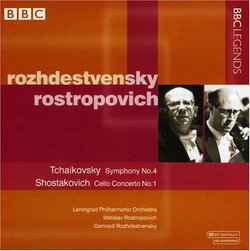| All Artists: Dmitry Shostakovich, Pyotr Il'yich Tchaikovsky, Gennady Rozhdestvensky, Leningrad Philharmonic Orchestra Title: Tchaikovsky: Symphony No. 4; Shostakovich: Cello Concerto No. 1 Members Wishing: 1 Total Copies: 0 Label: BBC Legends Release Date: 4/27/2004 Genre: Classical Styles: Forms & Genres, Concertos, Instruments, Strings, Symphonies Number of Discs: 1 SwapaCD Credits: 1 UPC: 684911414325 |
Search - Dmitry Shostakovich, Pyotr Il'yich Tchaikovsky, Gennady Rozhdestvensky :: Tchaikovsky: Symphony No. 4; Shostakovich: Cello Concerto No. 1
 | Dmitry Shostakovich, Pyotr Il'yich Tchaikovsky, Gennady Rozhdestvensky Tchaikovsky: Symphony No. 4; Shostakovich: Cello Concerto No. 1 Genre: Classical
|
Larger Image |
CD Details |
CD ReviewsA passionate live Tchaikovsky Fourth coupled with a commandi Santa Fe Listener | Santa Fe, NM USA | 03/24/2009 (5 out of 5 stars) "By the seventies, visits to London by the famed Leningrad Phil. were no longer a rarity. Ten years previously they were, and the orchestra's legendary conductor, Evgeny Mravinsky, scored a triumph then with Tchaikovsky's last three symphonies (recorded on the spot by DG). Good as Rozhdestvensky's account of the Fourth is, it can't help but be overshadowed. Yet on its own, this is a passionate reading. It takes a while to get started, but once the music ignites, there's high drama and excitement, countered with refinement of string tone in the Andantino. The best of both worlds, then.
Brass and wind intonation are very good for a concert setting. The recorded sound from BBC is also quite good in terms of balance and impact. In later years Rozhdestvensky would prove a maddeningly variable conductor, but another BBC Legends release, of the entire score to Sleeping Beauty in concert, reaches a high level fo accomplishment. We switch from stereo to mono for the Shostakovich concerto, performed by Rostropovich in 1960. Since a number of stereo versions exist from him, both live and in the studio, the question is whether this one from Usher Hall in Edinburgh is special. To begin with, the recorded sound is impeccable, and the cello, miked very close, comes across vibrantly. Many collectors will already know the Sony recording under Ormandy when Rostropovich premiered the Shostakovich First in 1959. It has the advantage of being in stereo, and the all-important horn part is played by Mason Jones -- the wobbly Leningrad horn soloist comes nowhere near the Philadelphian for virtuosity. Nor do I think Rostropovich has significantly changed his interpretation, which is, needless to say, commadning. We've gotten many outstanding versions in the past fifty years, yet none so naturally attuned to the score. Rozhdestvensky is just as attuned, so on musical grounds alone, I'd give this wonderful performance the edge over the Ormandy, although it is wonderful, too. What Ormandy fails to capture is the ghostly atmopshere of the second movement and the melancholy of Shostakovich's emotional world, with its infinite shades of gray. In sum, this is a totally riveting release, a high point in BBC Legends' entire catalogue that chronicles British musical life over six decades in the postwar era." |

 Track Listings (8) - Disc #1
Track Listings (8) - Disc #1